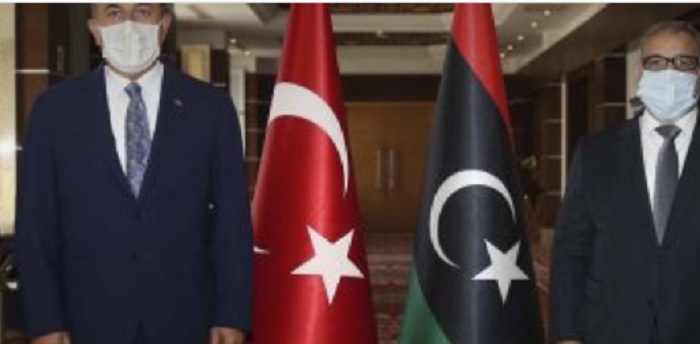
Egypt shows openness to contacts with political forces in western Libya.
UN-sponsored negotiations resumed Thursday in the Moroccan city of Bouznika between representatives of the Tobruk-based parliament and the High Council of State (HCS), amid disagreements over a proposal for Turkey’s exit from Libya.
Despite attempts by the two camps to break Libya’s political deadlock, members of the Libyan Government of National Accord (GNA) are said to have opposed any proposal that stipulates a Turkish withdrawal.
Libyan sources also indicated that the GNA refused the notion of cancelling agreements signed with Ankara and forming a neutral international committee to review these deals.
Sources also revealed a proposal has been put forward to allow international supervision of the country’s oil ports which would continue to be secured by the eastern-based Libyan National Army (LNA), under the command of Field Marshal Khalifa Haftar.
Dialogue was suspended Wednesday after several days of talks. Mohamed Khalifa Najm, a representative of the Libyan High Council of State, said in a statement on behalf of the two delegations that constructive political dialogue had taken place, stressing that both parties hope to achieve concrete results that could pave the way for a comprehensive political settlement.
On Wednesday, a Libyan delegation began talks with high-level officials in Cairo to discuss developments in the Libyan crisis and help end divisions between Tobruk and Tripoli and create a unified political body that can monitor developments.
Egyptian sources confirmed to The Arab Weekly that “a mixed Libyan delegation arrived Tuesday evening and included five members in the parliament of Libya’s GNA: Muhammad al-Ra’idh, Abu Bakr Saeed, Ayman Saif al-Nasr, Abdullah al-Lafi and Fahim bin Ramadan, and three members of the HCS: Saad bin Shardah, Balqasim Qzeit, Abdullah Jawan and Hassan Chabba from the leadership of Misrata”.
The same sources denied that Taj al-Din al-Razaki, a national security adviser to GNA President Fayez al-Sarraj attended, as some Libyan media outlets reported.
Some Libyan sources had previously limited the role of Cairo to extending support for Libyan Parliament Speaker Aguila Saleh and Haftar. The makeup of the Libyan delegation has dispelled that notion.
The Libyan HCS’s media office, headed by Muslim Brotherhood-affiliated Khalid al-Mishri, indicated that it did not send a delegation to Cairo, and said that “at a time when the Council welcomes an invitation to visit Egypt to discuss what serves the interests of the two countries,” it denies sending any delegation for the moment.
Sarraj and Mishri sent mixed messages on the subject in recent days, relaying their intent to communicate positively with Cairo and expressing appreciation for its role in resolving the crisis after previously criticising Cairo’s involvement and accusing it of standing behind the LNA and supporting military intervention in favour of Haftar.
Egyptian sources revealed to The Arab Weekly that members of the delegation that visited Cairo came from several regions of western Libya.
The sources also pointed out that Egypt is working hard to unify the army, limit the deployment of mercenaries sent by Turkey to Libya, establish bases for a strong security system that can put an end to militias’ monopoly on security in Tripoli and unify parliament as the country’s only constitutional body.
The Arab Weekly learned that Cairo wants to keep its lines of communication open to the majority of forces wanting to resolve the crisis.
The public visit of three members of the State Council, even if they were representing only their regions, reflected a crack in Egypt’s opposition to all dialogue with Islamist forces.
Ahmed Aliba, an expert with the Egyptian Centre for Strategic Studies (ECSS), said that “the Libyan delegation’s visit aims to prepare for the post-ceasefire phase, as Cairo has worked hard to uphold, paving the way for more visits from other Libyan parties in the upcoming days.”
“The visit proves that there is a convergence of views between Cairo and the Libyan West, and there are no categorical rejections of the GNA and those allied with it. Egypt is keen to deal with all parties to resolve the crisis,” added Aliba.
